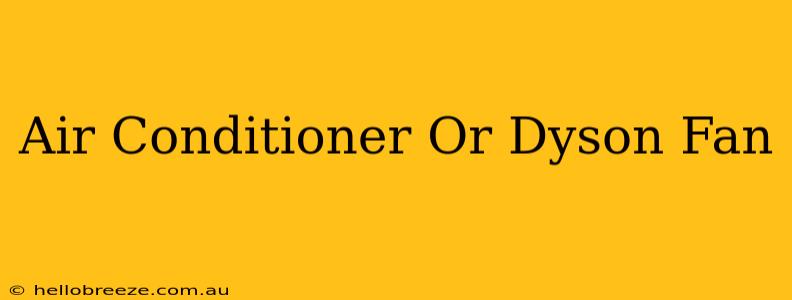Summer's heat can be brutal, leaving you searching for the best way to stay cool. Two popular options often top the list: air conditioners and Dyson fans. But which one reigns supreme? The answer, as with most things, depends on your individual needs and priorities. This comprehensive guide breaks down the pros and cons of each, helping you make the informed decision that best suits your cooling needs and budget.
Air Conditioners: The Heavy Hitters of Cooling
Air conditioners are the undisputed champions of powerful cooling. They work by removing heat and humidity from the air, creating a significantly cooler and more comfortable environment.
Pros of Air Conditioners:
- Superior Cooling Power: Air conditioners offer unmatched cooling power, especially in extremely hot and humid climates. They can drastically lower the temperature of a room, providing immediate relief from the heat.
- Humidity Control: Beyond just cooling, air conditioners effectively dehumidify the air. This is a game-changer in humid climates, making the air feel much more comfortable even at slightly higher temperatures.
- Improved Air Quality (with filters): Many modern air conditioners come equipped with air filters that can remove dust, pollen, and other allergens, improving indoor air quality.
Cons of Air Conditioners:
- High Energy Consumption: Air conditioners are notorious energy guzzlers. Running them consistently can significantly increase your electricity bill.
- Higher Initial Cost: The upfront cost of purchasing and installing an air conditioner is typically much higher than that of a Dyson fan.
- Maintenance: Air conditioners require regular maintenance, including filter cleaning and occasional professional servicing, to ensure optimal performance and longevity.
- Potential for Noise: Some air conditioners can be quite noisy, which can be disruptive, especially at night.
Dyson Fans: The Stylish and Efficient Alternative
Dyson fans, known for their sleek design and innovative technology, offer a compelling alternative to traditional air conditioners. They utilize bladeless technology and powerful airflow to provide a refreshing breeze.
Pros of Dyson Fans:
- Energy Efficiency: Dyson fans consume significantly less energy than air conditioners, leading to lower electricity bills.
- Safety: The bladeless design eliminates the risk of accidental injuries, making them a safer option for households with children and pets.
- Quiet Operation: Dyson fans are generally quieter than air conditioners, providing a more peaceful cooling experience.
- Aesthetic Appeal: Their modern and sleek design enhances the look of any room.
- Oscillation and Multiple Speed Settings: Many models offer a wide range of speed settings and oscillation options for customized cooling.
Cons of Dyson Fans:
- Limited Cooling Power: Dyson fans primarily circulate air; they don't actually remove heat and humidity like air conditioners. Therefore, they are less effective in extremely hot and humid conditions.
- Higher Initial Cost (than standard fans): While more energy-efficient in the long run, the initial purchase price of a Dyson fan is higher than a standard fan.
- Maintenance: While generally low-maintenance, regular cleaning is necessary to ensure optimal performance.
The Verdict: Choosing the Right Cooling Solution
The best choice between an air conditioner and a Dyson fan depends entirely on your specific circumstances:
- Choose an air conditioner if: You live in a hot and humid climate, require powerful cooling, and are less concerned about energy costs.
- Choose a Dyson fan if: You prioritize energy efficiency, quiet operation, safety, and a stylish design, and live in a climate that doesn't experience extreme heat and humidity. Consider a Dyson fan as a supplemental cooling solution alongside other methods like opening windows for cross-ventilation.
Ultimately, understanding the strengths and weaknesses of each option allows you to select the cooling solution that best fits your lifestyle, budget, and climate. Don't hesitate to weigh the pros and cons carefully before making your final decision.

